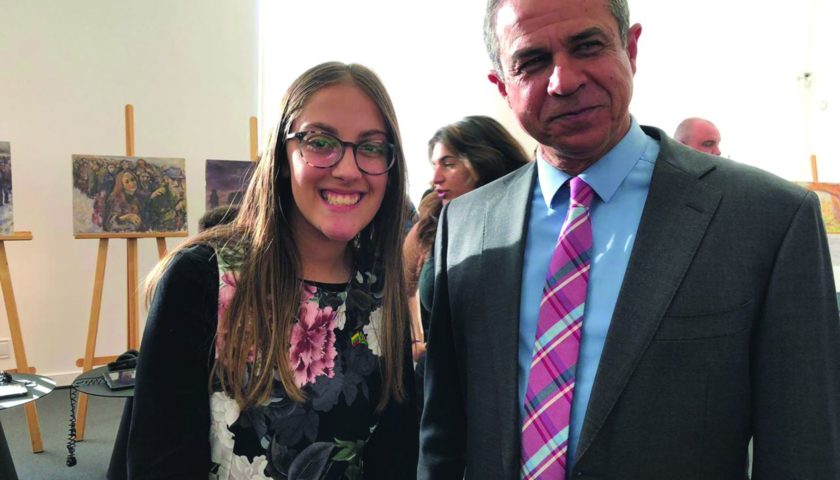Ira Zlotowitz reflects on the life of his father, Rabbi Meir Zlotowitz, the Founder of Artscroll
By Ilan Preskovsky
Rabbi Meir Zlotowitz, z”l, was a Torah and business leader of singular impact. As the founder and head of Artscroll Mesorah publishing (along with Rabbi Nosson Scherman, who was his business partner, collaborator, and close friend since Artscroll’s inception in the mid ‘70s until Rabbi Zlotowitz’s death in June 2017), Rabbi Zlotowitz touched the lives of countless Jews across the world with an ever-growing series of books that include siddurim, chumashim, various sefarim, biographies, Jewish novels, and, perhaps the publisher’s most audacious and ambitious project to date: the entire Talmud, fully translated and annotated in plain, modern English – first the more widely used Talmud Bavli (a whopping 73 volumes), followed later by the Talmud Yerushalmi (46 volumes).
Known as the Schottenstein Talmud, both the Bavli and the Yerushalmi took years and literally tens of millions of dollars to complete. In the quarter century since its first edition, it has utterly revolutionised Talmud study by granting access to inarguably the most important Jewish text outside of the Tanach itself to those unfamiliar with Aramaic or who had not been previously instructed in how to learn and digest a page of Talmud. Daf Yomi, the acclaimed programme where participants get through the entirety of the Talmud Bavli once every seven years by studying a double-sided page a day, certainly wouldn’t have been anywhere near as successful and popular without the Schottenstein Talmud. More fundamentally, there wouldn’t be anywhere near as many Jews learning Talmud as part of their daily life – especially those who weren’t privileged to spend a substantial amount of time in a Yeshiva when they were younger.
Artscroll was hardly the first to translate the siddur into English, obviously, but there have even been various translations of the Talmud available since the early 20th century. The main selling point of Artscroll and the true testament to Rabbi Zlotowitz’s vision, then, has always been in its presentation. Boasting meticulous production values, a keen eye for design, and translations and commentaries of utmost literary quality, Artscroll puts out works of genuine artistry that are both accessible to all and a pleasure to read, learn, and pray from.
Such a surprisingly revolutionary approach has much to do with its founder’s own background and creative talents. Rabbi Zlotowitz had been, from a young age, a gifted artist and writer and, even as he spent years as a close personal student of none other than Rabbi Moshe Feinstein, ztz”l, at Mesivtha Tiferet Yerushalayim, he would constantly find himself involved in Torah-related writing and art projects. When it came time to start earning a living, he unsurprisingly found himself applying his gifts to a small business called Artscroll that created beautiful brochures, wedding invitations, and ketubot.
Artscroll would soon transform from a humble graphic-arts studio into a fully-fledged publisher of artfully designed and presented Jewish books in the mid-‘70s when Rabbi Zlotowitz began work on a fully translated and commentated edition of Megillas Esther with then principal of Boro Park’s Yeshiva Karlin Stolin, Rabbi Nosson Scherman. The book was created in the memory of a close friend of Rabbi Zlotowitz, Rabbi Meir Fogel, a teacher at Toras Emes, who passed away unexpectedly in his sleep in his early 30s. This highly personal project quickly proved itself to be a massive success, selling out of its original print run, and what was supposed to be a once-off collaboration between Rabbis Zlotowitz and Scherman went on to become – with the encouragement and supports of such Torah greats as Rabbi Moshe Feinstein, Rabbi Yaakov Kamenetsky, and Rabbi Mordechai Gifter – a decades-long partnership running the biggest and best-known publisher of Jewish books in the United States.
This is the incredible origin story of Artscroll, but no less extraordinary was the man behind it.
Ira Zlotowitz Remembers His Father
Rabbi Meir Zlotowitz is survived by his second wife, Rochel, eight children (four sons and four daughters), and many grandchildren. That the large family he leaves behind are as well respected and beloved as they are, making their own indelible marks on the world around them, says a lot about the sort of man Rabbi Zlotowitz was. For all of his success in publishing, it is clear that he leaves behind a tremendous legacy that extends far beyond the printed page.
His second son, Ira Zlotowitz, for example, took a somewhat different path to his father, finding massive success in the corporate world as the co-founder and president of Eastern Union Funding, one of the United States’ leading real estate mortgage-brokerage firms. As successful in his chosen field as his father was in his, Ira constantly refers to his father as a “role model and mentor” in both life and business; someone who was always there to guide him and provide advice when he needed it.
No doubt the purely corporate business world in which Ira finds himself has numerous differences with the mix of commerce and art that defines even the most successful publishing houses, but that hasn’t stopped Ira from crediting his father in his general approach to business. “My father stressed that no matter what field you find yourself in, you must always be honest and ethical and to take special care with how you treat those who work for you.” With regard to worth ethic, his father’s advice to him was equally pointed: “Don’t say you can’t do something and don’t make excuses.”
In terms of his going in the direction he did professionally, Ira shrugs off the idea that there was ever any pressure on him for not following his father into more Torah-centric work. “The only pressure my father ever put on me was to do something that would make a difference in this world.” This simple idea became a cornerstone of Ira’s life, both professionally in the form of Eastern Union, but also in his private life.
Indeed, with this motto in mind, Ira has made his own major contribution to the Torah world in the form of a programme that he started when he was just 19 and still studying in yeshiva – he would enter the business world at 21. The programme, called Masmid Gohova, gives prizes to learners from grades six to eight for throwing themselves into their limudei kodesh studies. The more they learn, the more points they accumulate; the more points they have, the more likely they are to win a variety of prizes, ranging from free pizzas to bicycles. What started off as a small programme aimed at a couple dozen kids has ballooned into a national programme that has incentivised thousands of Jewish children each year to improve their Torah learning.
At Home and At Work
One thing about Rabbi Meir Zlotowitz that is mentioned not just by Ira but by the rest of his family and in every single obituary written about him following his passing two years ago was that he was a humble, soft-spoken man who would treat those around him with the sort of personal attention that utterly belies the fact that he was at the head of both a thriving publishing business and a large, no less thriving family. His employees loved and respected him for it and his wife and children enjoyed the sort of love and attention from their husband and father that is all too often sadly lacking in the households of the mega-successful.
This extraordinary aspect of his father is emphasised both by Ira and in tributes paid to Rabbi Zlotowitz by his brothers and sisters. “My father was a strong family man, who imparted in us the importance of tradition and in living a true Torah life.” Ira and his siblings have both told stories how no matter how busy their father was, he would always make time for them, both in terms of helping them with homework, driving lessons, or just taking time out of his day to chat with them about whatever was on their mind.
This is no doubt why, despite Rabbi Zlotowitz’s status as a true leader and visionary to the Jewish world at large, Ira and his siblings talk about him not in terms of Artscroll, but in terms of his being a father, a mentor, and role model to them. Ira also notes that he was born just as Artscroll was starting to really take off and that, despite his father’s rapidly increasing fame, it was never really a “thing” to him and that his father was never anything other than his beloved father. And that was always more than enough.
Along with his prestigious publishing company and his many children and grandchildren, Rabbi Meir Zlotowitz’s legacy also continues on a website that has been created in his memory, Klal Govoha (https://www.klalgovoah.org) that “publishes weekly titbits that every Jew should know about” and on the minyan-finder website, goDaven (https://www.godaven.com) that is maintained by Klal Govoah and is in the process of being revamped.




